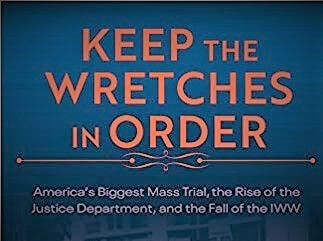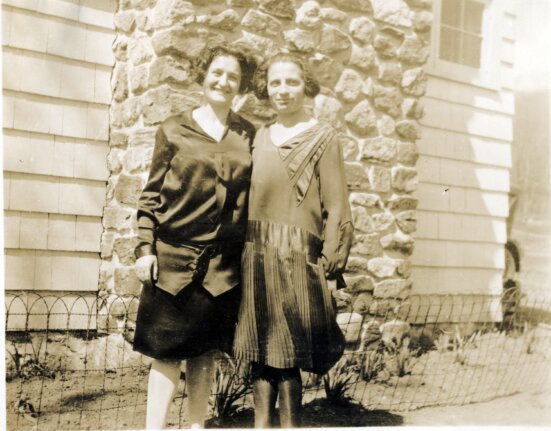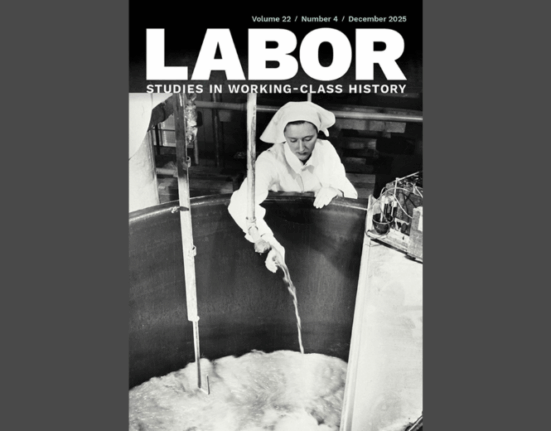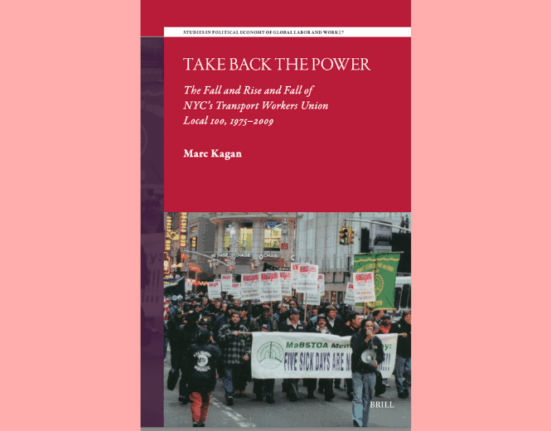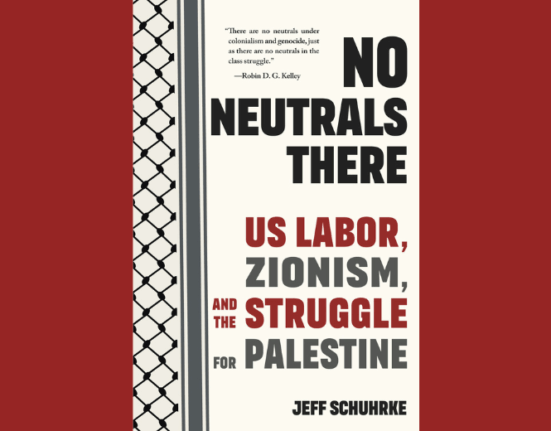Paul Buhle’s review of Dean A. Strang, Keep the Wretches In Order: America’s Biggest Mass Trial, the Rise of the Justice Department and the Fall of the IWW. Madison: University of Wisconsin Press, 2019.
Radical historians and even liberal scholars are drawn for good reason, these days, to the tales of political repression. Accounts of systematic police brutality in Chicago, accounts of what amounts to warfare against local black populations in the South and Southwest during the 1910-20s, these and others lay out the painful details. The legal structures of the country are not set up for the poor and racially disadvantaged. Not that this is a surprise, but the savagery against those organizing against repression and for a better society, makes for useful reading.
The Industrial Workers of the World, as civil liberties lawyer Dean Strang says, constituted no persistent threat to the social order of the US in most of the 1910s. The organization, founded in 1905, barely survived the recession of 1907-08, and political or pragmatic splits in the ranks ripped away thousands of socialists and practical unionists. The grand Lawence, Massachusetts “Bread and Roses” Strike of 1912 dramatized the potential of trans-ethnic solidarity but left no lasting Wobbly organization behind.
The Wobs had their marvelous methods of agitation, including songs and slogans, they had tens of thousands of itinerant farmworkers and timber workers. As Strang learns in assorted government documents, the fix was in with Woodrow Wilson’s presidential victory in 1916. Attorney General A. Mitchel Palmer had resolved to get rid of all sources of potential “disorder,” in preparation for a US entry into the war that Wilson himself knew was coming even as he ran successfully on the platform, “He Kept Us Out Of War.”
This is not new territory for Srang. A few years ago, Worse Than The Devil analyzed the persecution of hapless Italian immigrants in Milwaukee after a 1917 bombing of a police station. Nor is defense of civil liberties a mere historical hobby for the author, a high profile attorney in Wisconsin best known for defending those unlikely to get serious help elsewhere.

Here, in the prosecution of the Wobblies almost to the point of extinction, the phrase that offers the title was written by high Justice Department official. Intimidation, planned and written about privately, offered the real strategy against supposed threats of all kinds. In this case, an astonishing 166 Wobblies in Chicago alone were charged with a conspiracy to violate the Espionage Act.
That Act, still in force today and used mainly against “leakers,” is notable for its wide sweep, erasing the line between committing any crime and writing or speaking negatively about a cause deemed itself to be so necessary to national defense that conviction seems almost certain. Strang the civil libertarian wants us to understand that peaceniks of any kind, anyone attempting to organize or speak against war making, falls under this stricture.
It’s a pretty grim saga in Keep the Wretches. As the case winds its way upward through the courts, parts of the indictment are struck down, but others are upheld. That the government had seized IWW records without legal grounds as well as other improprieties, with the kinds of methods and charges that would be thrown out of court, but only long after the fever of wartime had passed….and before the government once again needed to tinker of legal considerations to commit acts most definitely unconstitutional.
I am not so certain about the narrative choices of the author. He chooses mainly the obvious prosecutorial and defense figures, describing their personalities and actions well, based perhaps on access to archives. Among Wobblies, he takes up the case of the somewhat obscure but fascinating Ed Doree, prosecuted and suffering badly. Doree the rank-and-filer sometimes seems to be posed against Big Bill Haywood, who skipped out on his bail and died in Russia, an act at least understandable for a figure who had done so much and faced the threat of lengthy prison sentences more than once. Nor does the quotation of one sentence from Haywood using the word “nigger” convince me that he was less egalitarian or supportive of African American workers, and I view this as another jab at one of America’s very great labor heroes.
For all the convicted Wobblies except those who chose to be deported or managed to get away, the consequences were pretty overwhelming. Strang cites Chicago propagandist Mary Marcy turning over her mortgage to pay for Haywood’s bail, and losing all. Strang writes that she committed suicide on this account, as if Haywood’s departure alone, rather the lost hopes of the 1910s, had not condemned thousands of socialists to nostalgia and depression. But these seem to me small slips in a valuable book.
For the organization, the trials were not quite the final word. The Agricultural Workers Order (AWO) actually survived with thousands of members into the early 1920s, until a split completed the precipitous membership decline. Seen another way, young radicals by then inclined to join the Communist ranks (as had Haywood at the first opportunity), leaving mostly old-timers behind.
The prosecution of Eugene Debs, the Wobblies and others on the flimsiest of constitution grounds anticipated the spies planted and raids conducted by the same J. Edgar Hoover in later decades, the murders and show trials of Black Panthers, and all the other misdeeds of federal authorities, leaving aside the local Red Squads and the well documented brutalities that were not halted by noted liberal presidents and that continue today. Strang knows his field and he has told us much.##

